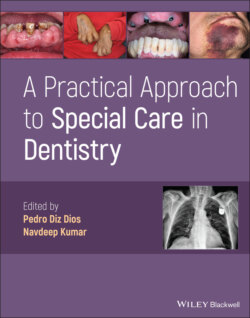Читать книгу A Practical Approach to Special Care in Dentistry - Группа авторов - Страница 109
Structured Learning
Оглавление1 What are lip fissures and what causes them?Lip fissures are a frequent finding in patients with Down syndrome (>25%), especially among men, with a peak prevalence in the third decade, and occur preferentially in the lower lipTheir aetiology is unknown (embryological defects, mandibular prognathism and lip eversion have been implicated)In most patients, the lesions coexist with angular cheilitis and are colonised by Candida albicans
2 What factors are considered important in assessing the risks of managing this patient?SocialFavourable family environmentHearing impairmentComplications can arise due to other comorbidities associated with Down syndrome (e.g. premature ageing and cognitive impairment)MedicalRespiratory dysfunctionFatigue/reduced tolerance for treatment in relation to anaemiaCorrected atrial septal defect is not associated with risk when delivering dental interventionDentalMultiple failed attempts at providing removable partial denturesOral hygiene could be improvedMultiple missing teeth but low caries rate; chronic periodontal disease likely cause of tooth lossPrognosis of the remaining teeth guardedImplication for success of osseointegrated dental implantsGastroesophageal reflux‐related risk of dental erosionAnaemia‐related oral side‐effects (pale mucosa, glossitis, oral ulceration)
3 What factors determine the prognosis of the dental implants in this patient (Figure 2.3.3)?The available bone volume is limitedOsteopeniaSusceptibility to infections (potential defects in neutrophil chemotaxis due to Down syndrome)Sub‐optimal oral hygiene and a history of periodontal disease can favour the onset of peri‐implantitis. Ongoing oral hygiene/periodontal support provided due to variable complianceObserved higher failure rate: in patients with Down syndrome, 1 in every 5 dental implants fails
4 If considering the use of dental premedication/sedation to place dental implants, what additional factors should be taken into account?Benzodiazepines should not be prescribed for patients with severe respiratory dysfunction or hypotonia (musculoskeletal effect of Down syndrome)Theophylline reverses the sedative effect of benzodiazepines
5 Is administering antibiotic prophylaxis before a surgical procedure such as implant insertion justified?The corrected atrial septal defect does not justify the prescription of antibiotic prophylaxis for the prevention of bacterial endocarditisHowever, the immunological defects observed in Down syndrome may constitute an indication for administering antibiotics prior to the surgical procedure and for maintaining them in the postoperative periodFigure 2.3.2 Cone beam computed tomography showing a bone defect in the upper left quadrant.Figure 2.3.3 (a–d) Prosthodontic rehabilitation with a new upper dental prosthesis supported on the remaining teeth and 2 osseointegrated implants.
6 What antibiotics should be avoided for this patient?The toxicity of theophylline increases with macrolide antibiotics and quinolones
